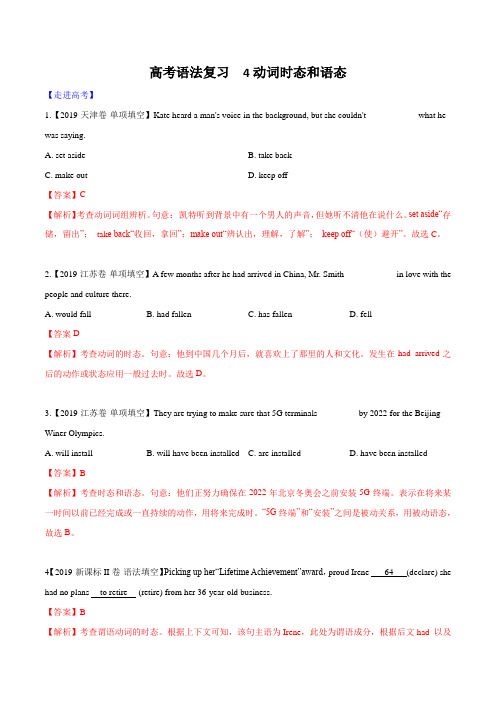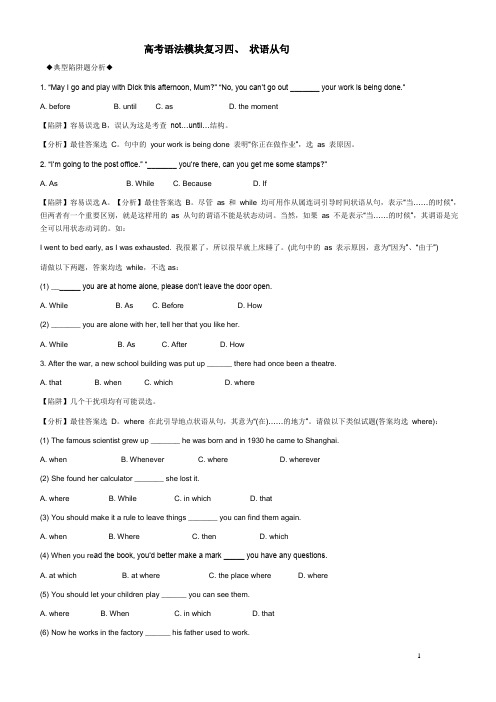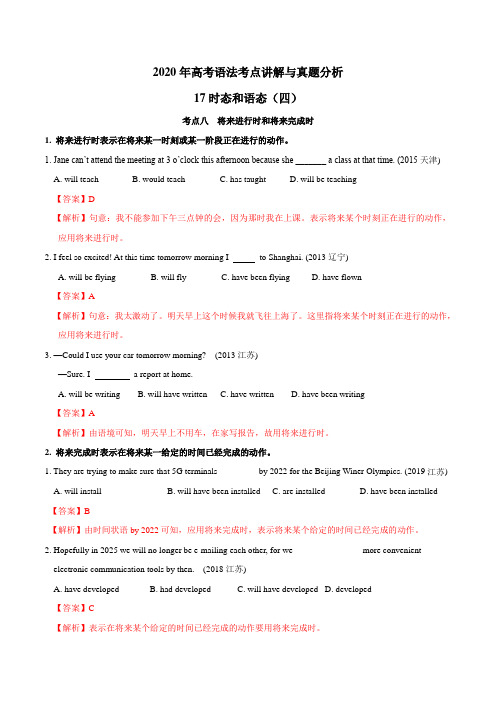2020年高考英语 语法备考(典型陷阱+分析+练习)动词时态考点
- 格式:doc
- 大小:105.50 KB
- 文档页数:11

高考语法复习4动词时态和语态【走进高考】1.【2019·天津卷·单项填空】Kate heard a man's voice in the background, but she couldn't ___________ what he was saying.A. set asideB. take backC. make outD. keep off【答案】C【解析】考查动词词组辨析。
句意:凯特听到背景中有一个男人的声音,但她听不清他在说什么。
set aside“存储,留出”;tak e back“收回,拿回”;make out“辨认出,理解,了解”;keep off“(使)避开”。
故选C。
2.【2019·江苏卷·单项填空】A few months after he had arrived in China, Mr. Smith ___________ in love with the people and culture there.A. would fallB. had fallenC. has fallenD. fell【答案D【解析】考查动词的时态。
句意:他到中国几个月后,就喜欢上了那里的人和文化。
发生在had arrived之后的动作或状态应用一般过去时。
故选D。
3.【2019·江苏卷·单项填空】They are trying to make sure that 5G terminals_________ by 2022 for the Beijing Winer Olympics.A. will installB. will have been installedC. are installedD. have been installed【答案】B【解析】考查时态和语态。
句意:他们正努力确保在2022年北京冬奥会之前安装5G终端。

2020高三第二轮专题讲解动词是英语中最灵活、最难掌握的词,在历年高考题中动词所占比例最大。
设题时给出四个不同的动词或短语来测试考生在具体语境中对动词及其短语意义的理解和运用能力。
主要出现在单项选择及完形填空中。
英语中的时态共有十六种,但是常考的或较常用的有十一种。
见下表:(一)一般现在时1.表示经常或习惯性的动作,多用行为动词,且常与表频率的时间状语连用We always care for each other and help each other.2.表示客观事实或普遍真理(不受主句时态的限制)The geography teacher told us the earth moves around the sun.1.表示一个按规定、计划或安排要发生的动作,只用一般现在时;The plane takes off at 10:00 a.m.飞机上午10点起飞。
2.在时间、条件状语从句中常用一般现在时代替将来时。
但要注意由if 引导的条件状语从句中有时可以用shall 或will 表“意愿”,不表示时态;I’ll go there after I finish my work.If you will accept my invitation and come to our party, my family will be pleased.3.以here, there开头的句子里,go, come等少数动词的一般在时表示正在发生的动作。
There comes the bus.汽车来了。
Here she comes.她来了。
(二)一般过去时1.过去某一时间内经常发生或反复发生的动作或存在的状态He lived in Beijing when he was young.他年轻时生活在北京。
2.表达过去发生的动作We visited the factory last Friday.上周五我们参观了那家工厂。

解密06动词的时态和语态【命题趋势】1. 语法填空以时态的考查为主,语态的考查为辅。
2. 在语法填空中侧重考查一般时,进行时及完成时。
3. 动词的时态和语态是高考中出现频率最高的语法项目。
考题创设的语境比较明确,通常是根据所设置的语境中的信息判断时态以及主谓语之间的主谓或动宾关系。
【名师指导】1. 了解并能正确运用常考的11种时态;2. 熟练运用现在完成时、现在完成进行时、一般过去时等高考高频时态;3. 掌握几种易混时态的区别,如现在完成时和一般过去时等。
动词时态的知识网络(以动词do为例)一般时包括一般现在时、一般过去时、一般将来时和一般过去将来时。
一、一般现在时1. 一般现在时的构成一般现在时主要用动词原形来表示。
主语是第三人称单数时,动词后面要加-s或-es。
☞They want good jobs.他们想要好的工作。
☞The coat matches the dress.外衣和裙子很相配。
☞This work does not satisfy me.这项工作我不满意。
☞Do you understand?你懂了吗?2. 一般现在时的用法①一般现在时的基本用法a. 表示现在习惯性的动作或存在状态☞He always takes a walk after supper.晚饭后他总是散散步。
☞Everyone is in high spirits now.现在大家都情绪高涨。
b. 表示客观事实或普遍真理☞The sun rises in the east and sets in the west.太阳从东方升起在西方落下。
☞Sound travels faster through water than it does through air.声音在水中的传播速度要比在空气中快。
☞Time and tide wait for no man.时间不等人。
c. 表示主语的特征、能力和状态☞This cloth feels soft.这布摸上去很软。

高考语法模块复习四、状语从句◆典型陷阱题分析◆1. “May I go and play with Dick this afternoon, Mum?” “No, you can’t go out _______ your work is being done.”A. beforeB. untilC. asD. the moment【陷阱】容易误选B,误认为这是考查not…until…结构。
【分析】最佳答案选C。
句中的your work is being done 表明“你正在做作业”,选as 表原因。
2. “I’m going to the post office.” “_______ you’re there, can you get me some stamps?”A. AsB. WhileC. BecauseD. If【陷阱】容易误选A。
【分析】最佳答案选B。
尽管as 和while 均可用作从属连词引导时间状语从句,表示“当……的时候”,但两者有一个重要区别,就是这样用的as 从句的谓语不能是状态动词。
当然,如果as 不是表示“当……的时候”,其谓语是完全可以用状态动词的。
如:I went to bed early, as I was exhausted. 我很累了,所以很早就上床睡了。
(此句中的as 表示原因,意为“因为”、“由于”)请做以下两题,答案均选while,不选as:(1) _______ you are at home alone, please don’t leave the door open.A. WhileB. AsC. BeforeD. How(2) _______ you are alone with her, tell her that you like her.A. WhileB. AsC. AfterD. How3. After the war, a new school building was put up ______ there had once been a theatre.A. thatB. whenC. whichD. where【陷阱】几个干扰项均有可能误选。

高考英语考点典型陷阱题分析-It的用法it的用法考点◆典型陷阱题分析◆1. Everyone knows that _______ is dangerous to play with fire, but _______ is difficult is to prevent children from playing with fire.A. it, it B. what, whatC. it, what D. what, it【陷阱】很容易误选B,认为两空均考查形式主语。
【分析】最优答案是D,第一空填形式主语,真正的主语是其后的不定式to play with fire。
第二空填what,what is difficult 是主语从句,注意what is difficult 后的谓语动词is。
请做以下类似试题:(1) I know ______ is important to know my own limitations, but _______ is difficult is to help others to know their own limitations.A. it, itB. what, whatC. it, whatD. what, it(2) Yes, ______ is difficult to find a job nowadays, but _____ is more difficult is try to find such a job with a high salary but little things to do.A. it, itB. what, whatC. it, whatD. what, it2. I dislike _______ when others laugh at me in public or think poorly of me behind.A. that B. thoseC. it D. them【陷阱】几个干扰项均有可能误选。

2020年高考语法考点讲解与真题分析17时态和语态(四)考点八将来进行时和将来完成时1. 将来进行时表示在将来某一时刻或某一阶段正在进行的动作。
1. Jane can’t attend the meeting at 3 o’clock this afternoon because she _______ a class at that time. (2015天津)A. will teachB. would teachC. has taughtD. will be teaching【答案】D【解析】句意:我不能参加下午三点钟的会,因为那时我在上课。
表示将来某个时刻正在进行的动作,应用将来进行时。
2. I feel so excited! At this time tomorrow morning I to Shanghai. (2013辽宁)A. will be flyingB. will flyC. have been flyingD. have flown【答案】A【解析】句意:我太激动了。
明天早上这个时候我就飞往上海了。
这里指将来某个时刻正在进行的动作,应用将来进行时。
3. —Could I use your car tomorrow morning? (2013江苏)—Sure. I a report at home.A. will be writingB. will have writtenC. have writtenD. have been writing【答案】A【解析】由语境可知,明天早上不用车,在家写报告,故用将来进行时。
2. 将来完成时表示在将来某一给定的时间已经完成的动作。
1. They are trying to make sure that 5G terminals_________ by 2022 for the Beijing Winer Olympics. (2019江苏)A. will installB. will have been installedC. are installedD. have been installed 【答案】B【解析】由时间状语by 2022可知,应用将来完成时,表示将来某个给定的时间已经完成的动作。
动词的时态知识点梳理背诵1.动词的时态——表格总览时态用法结构一般现在时O表示现在经常或习惯性的动作。
表示普遍真理或客观事实。
O表示能力,爱好,特征。
O表示现在的状态。
■主语+is/am/are+表语-主语+情态动词原形(can/ may/must)+do-主语(第一人称1,we,第二 人称you,第三人称复数they)+do-主语(第三人称单数he.she. it)+does 或v+s—般过去时O表示过去发生的动作或存在的状态。
O表示过去经常性或习惯性的动作。
-主语+动词过去式—般将来时O表示将来将要发生的动作。
叱主语+will/shall+do■主语+be(is/am/are)going to +d。
过去将来时O表示从过去某一时间看将要发生的事情。
—主语+would+d。
现在完成时O表示一个过去发生的动作,在过去已经完成,强调这个动作对现在产生的影响或结果(动作已完成)。
O表示一个过去发生的动作,一直持续到现在.并且有可能继续下去,也可能至此结束(动作未完成)。
•主语+have/has+done过去完成时O表示在过去某一时刻之前已完成的动作。
■主语+had+done现在完成进行时O表示动作从某一时间开始,一直持续到现在,或者刚刚终止,或者可能仍然要继续下去。
—主语+助动词(have/has)+been+doing+其他成分将来进行时O表示要在将来某一时间开始,并继续下去的动作或在将来某一时间点正在发生的动作。
■主语+shall/ will+ be + doing现在进行时O表示说话时进行的动作,不断重复的动作。
表示目前这一阶段正在进行的动作。
—主语+be(is/am/are) ♦doing过去进行时O表小过去某一时间正在进行的动作。
—主语+ be(was/were)+doing2.动词的时态一一数轴展示过去将来刃府奔成国冉来进行时•将来某个点一直进 行或正在进行的 动作无在完成进行时一成猊在时一倒身米明过去完成时一燧过去时过去进行时即,表示在比区间某个点 正在进行的动作现在进行时:现在某个 点一直进行或正在进行的动作易错知识点1.一般过去时与现在完成时的误用* 一般过去时表示过去某个时间发生的动作或情况,也表示过去习惯性动作,特别是由would/used to do 表达的句型,本身表示的就是过去时。
2020年高考英语语法必考考点(7)动词时态和语态【考点解读】一、动词的时态1.一般现在时(1)表示经常性、习惯性的动作和现在的状态、特征。
句中常用often, usually, every day 等时间状语。
Works of popular writers often have a lot of readers.On Monday mornings it usually takes me an hour to drive to work although the actual distance is only 20 miles.(2)表示客观事实、普遍真理或自然现象,无论在什么情况下都用一般现在时表示。
“Life is like walking in the snow,” Granny used to say,“because every step shows.”—So what is the procedure?—All the applicants are interviewed before a final decision is made by the authority.(3)在时间状语从句和条件状语从句中,用现在时代替将来时。
My parents have promised to come to see me before I leave for Africa.(4)表示按计划、时刻表规定要发生的动作,但限于少数动词。
如begin, come, leave, go, arrive, start, stop, return, open, close等。
The flight takes off at 2:30 every Wednesday and Friday.2.一般过去时(1)表示过去的事情、动作或状态,常与表示过去的时间状语连用(或上下文语境有暗示);用于表示过去的习惯;表示说话人原来没有料到、想到的事。
解密06动词的时态和语态【命题趋势】1. 语法填空以时态的考查为主,语态的考查为辅。
2. 在语法填空中侧重考查一般时,进行时及完成时。
3. 动词的时态和语态是高考中出现频率最高的语法项目。
考题创设的语境比较明确,通常是根据所设置的语境中的信息判断时态以及主谓语之间的主谓或动宾关系。
【名师指导】1. 了解并能正确运用常考的11种时态;2. 熟练运用现在完成时、现在完成进行时、一般过去时等高考高频时态;3. 掌握几种易混时态的区别,如现在完成时和一般过去时等。
动词时态的知识网络(以动词do 为例)现在时 过去时 将来时 过去将来时 一般时do / does did shall/will do should/would do 进行时am/is/are doing was/were doing shall/will be doing should/would be doing 完成时have/has did had did shall/will have did should/would have did完成进行时 have/has been doing had been doing shall/will have been doing should/would have been doing一般时包括一般现在时、一般过去时、一般将来时和一般过去将来时。
一、一般现在时1. 一般现在时的构成一般现在时主要用动词原形来表示。
主语是第三人称单数时,动词后面要加-s 或-es 。
☞They want good jobs.他们想要好的工作。
☞The coat matches the dress.外衣和裙子很相配。
考向1 一般时考点详解☞This work does not satisfy me.这项工作我不满意。
☞Do you understand?你懂了吗?2. 一般现在时的用法①一般现在时的基本用法a. 表示现在习惯性的动作或存在状态☞He always takes a walk after supper.晚饭后他总是散散步。
动词时态考点◆典型陷阱题分析◆1.“I _____ his telephone number.” “I have his number, but I ____ to bring my phone book.”A. forget, forgetB. forgot, forgotC. forget, forgotD. forgot, forget【陷阱】容易误选A,认为“忘记”是现在的事。
【分析】仔细体会一下对话的语境:第一个人说“我忘记他的电话号码了”,这个“忘记”应该是现在的情况,即现在忘记了,要不然就没有必要同对方说此话了,故第一空应填forget;第二个人说“我有他的号码,但我忘记带电话本了”,这个“忘记”应该是过去的情况,即过去忘记带电话本,所以现在电话本不在身上(注意句中的转折连词 but),故第二空应填 forgot,即答案选应C。
请再看一例:— Oh, I ______ where he lives.—Don’t you carry your address book?No, I ______ to bring it.A. forget, forgetB. forgot, forgotC. forget, forgotD. forgot, forget答案选C,理由同上。
2. I had hoped to see her off at the station, but I _____ too busy.A. wasB. had beenC. would beD. would have been【陷阱】容易误选B或D,认为前句用了had hoped,所以此句谓语要用B或D与之呼应。
【分析】但正确答案为A,前一句谓语用had hoped,表示的是过去未曾实现的想法或打算,可以译为“本想”,而后一句说“我太忙”,这是陈述过去的一个事实,所以要用一般过去时。
请做以下类似试题(答案均为A):(1) We had hoped to catch the 10:20 train, but _____ it was gone.A. foundB. had foundC. would findD. would have found(2) We had hoped that you would be able to visit us, but you _____.A. didn’tB. hadn’tC. needn’tD. would not have(3) We had wanted to come to see him, but we ____ no time.A. hadB. had hadC. would haveD. would have had(4) I had expected to come over to see you last night, but someone ______ andI couldn’t get away.A. calledB. had calledC. would callD. would have called(5) The traffic accident wouldn’t have happened yesterday, but the driver _______ really careless.A. wasB. isC. wereD. had been3. Dear me! Just _____ at the time! I _____ no idea it was so late.A. look, haveB. looking, hadC. look, hadD. looking, have【陷阱】此题容易误选D,认为第一空用现在分词表伴随,第二空填 have 的一般现在时,以保持与前面时态的一致性。
【分析】其实,此题应选C,第一空应填 look, 因为这是祈使句的谓语;第二空应填had,因为前一句说“看看时间吧”,这一看当然知道了现在很迟的情形,“不知道这么迟了”显然应是“过去”的事,故应用一般过去时态,许多同学由于忽略这一隐含的语境而误选。
4.“Your phone number again? I _____ quite catch it.” “It’s 4331577”A. didn’tB. couldn’tC. don’tD. can’t【陷阱】此题容易误选C,认为此处要用一般现在时态,表示现在“没听清对方的话”。
【分析】其实,此题答案应选A,根据上文的语境“请把你的电话号码再说一遍好吗?”可知“没听清对方的电话号码”应是在说此话以前,故应用一般过去时态。
请看以下类似试题:(1) “Mr Smith isn’t coming tonight.” “ But he _____.”A. promisesB. promisedC. will promiseD. had promised答案选B,“他答应(要来)”应发生在过去。
(2) “Hey, look where you are going!” “Oh, I’m terribly sorry. _____.”A. I’m not noticingB. I wasn’t noticingC. I haven’t noticedD. I don’t notice答案选B,“我没注意”是对方提醒之前的事,现经对方一提醒,当然注意到了。
(3) “Oh it’s you ! I ________ you.” “I’ve had my hair cut.”A. didn’t realizeB. haven’t realizedC. didn’t recognizeD. don’t recognized答案选C。
“没认出是你”是说此话之前的事,说此话时显然已经认出了对方。
(4) “What’s her new telephone number?” “Oh, I _____.”A. forgetB. forgotC. had forgottenD. am forgetting此题应选A,从语境上看,“忘记”的时间应是现在,即指现在不记得了。
(5) “Since you’ve agreed to go, why aren’t you getting ready?” “But I ______ that you would have me start at once.”A. don’t realizeB. didn’t realizeC. hadn’t realizedD. haven’t realized答案选B。
“没意识到”是对方提醒之前的事。
(6) “It’s twelve o’clock, I think I must be off now.” “Oh, really? I ______ it at all.”A. don’t realizeB. haven’t realizedC. didn’t realizeD. hadn’t realized答案选C。
“没意识到”是在听到的话之前的事。
5. Mr Smith ______ a book about China last year but I don’t know whether he has finished it.A. has writtenB. wroteC. had writtenD. was writing【陷阱】容易误选B或C。
【分析】此题应选D,这是由but I don’t know whether he ha s finished it 这一句话的语境决定的,全句意为“史密斯先生去年在写一本书,但我不知道他现在是否写完了”。
有的同学可能由于受 last year的影响而误选B。
但若选B,则句子前半部分的意思则变为“史密斯先生去年写了一本书”,既然是“写了”,那么这与下文的“但我不知道他现在是否写完了”相矛盾。
6. He has changed a lot. He _______ not what he _______.A. is, isB. was, wasC. is, wasD. was, is【陷阱】几个干扰项均有可能误选。
【分析】最佳答案选C,上文说“他”变化很大,即“他”现在不是过去的那个样子了,故第一空填is,第二空填 was(其实第二空也可用 used to be)。
请看类例:“What place is it?” “Haven’t you found out we _____ back where we ______?”A. were, had beenB. have been, areC. are, wereD. are, had been答案选C,We are back where we were 的意思是“我们(现在)又回到刚才来过的地方”。
7.He is very busy. I don’t know if he _____ or not tomorrow.A. comeB. comesC. will comeD. is coming【陷阱】此题容易误选B。
认为 if 引导的是条件状语从句,从句谓语要用一般现在时表示将来意义。
【分析】其实,此题答案应选C,句中if引导的不是条件状语从句(即if≠如果),而是宾语从句(即if=是否),句意为“他很忙,我不知道明天他是否会来。
”请看以下类似试题:(1) I don’t know if she _____, but if she ____ I will let you know.A. comes, comesB. will come, will comeC. comes, will comeD. will come, comes答案选 D,第一个 if 引导的是宾语从句,第二个 if 引导的是条件状语从句。
(2) “When _____ he come?” “I don’t know, but when he _____, I’ll tell you.”A. does, comesB. will, will comeC. does, will comeD. will, comes答案选 D,第一个 when 疑问副词,用于引出一个特殊疑问句;第二个 when是从属连词,用于引导时间状语从句。
(3) “When he _____ is not known yet.” “But when he ____, he will be warmly welcomed.”A. comes, comesB. will come, will comeC. comes, will comeD. will come, comes答案选 D,第一个 when 引导的是主语从句,第二个 when引导的是时间状语从句。